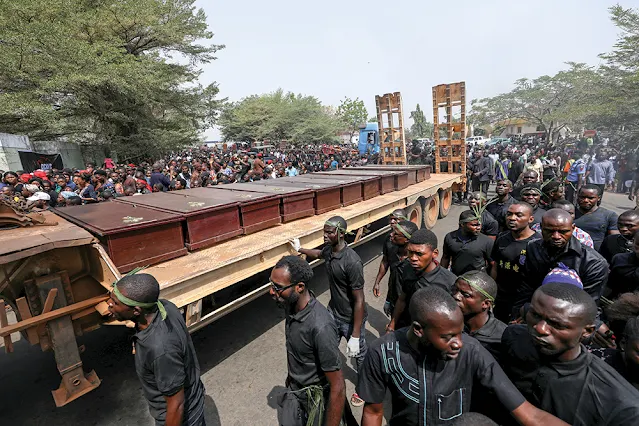Insecurity: Buhari Regime Failed To Tackle Killer Herdsmen, Time For National Dialogue – Says Tinubu
National Leader of All Progressive Congress, APC, Asiwaju Bola Ahmed Tinubu, has warned against helping herdsmen and leaving farmers unattended to, saying doing so may trigger resentment along ethnic lines.
Tinubu on Saturday demanded an urgent arrangement of a national dialogue to discuss Nigeria’s peace and security, saying his analysis of prevailing affairs has shown that President Muhammadu Buhari and other top administration officials have failed to address killer herdsmen and other debilitating security crises.
Tinubu, a member of Buhari’s ruling APC, said it was imperative for policymakers to first roll back acute insecurity before implementing progressive economic measures for the country’s estimated 200 million people.
Tinubu’s statement, which came in a Twitter chain on Saturday night, sought to strike a balance between the killer herdsmen activities and the push from southern Nigeria for the exit of Fulani as a silver bullet to banditry, kidnapping and other violent crimes.
The former Lagos governor said both sides of the crises have an enduring stake in Nigeria’s co-existence and should be allowed to first meet at a national conference to propose sundry solutions that will be acceptable across the spectrum.
Tinubu previously saw himself as a part of the Buhari administration, but the politician has made statements that cast him as an outsider of late.
It was unclear whether the move has anything to do with the recent decision by the Federal government to investigate him for corruption.
It was also unclear whether or not Tinubu, who plans a shot at the presidency in 2023, has suggested the solutions he enumerated in his statement to the president before making them public. A spokesman for the president did not return a request seeking comments about Tinubu’s blistering take on how Buhari has handled the matter since becoming president in 2015.
Read Mr. Tinubu’s full statement below:
The herder-farmer dispute has taken on acute and violent dimensions. It has cost too many innocent lives while destroying the property and livelihoods of many others. It has also aggravated ethnic sentiment and political tension.
Despite the efforts of some of those in positions of high responsibility and public trust, the crisis has not significantly abated.
Sadly, others who should know better have incited matters by tossing about hate-tainted statements that fall dangerously short of the leadership these people claim to provide. We all must get hold of our better selves to treat this matter with the sobriety it requires.
Both innocent and law-abiding farmer and herder need to be recompensed for the losses they have suffered. Both need further assistance to break the current cycle of violence and poverty.
In short, the continued progressive reform of many of our rural socio-economic relationships is called for. Based on these strategic observations. I recommend the federal government convene a meeting of state governors, senior security officials, herder and farmer representatives, along with traditional rulers and religious leaders.
The purpose of this meeting would be to hammer out a set of working principles to resolve the crisis.
After this meeting, governors of each state should convene follow-up meetings in their states to refine and add flesh to the universal principles by adjusting them to the particular circumstances of their states.
In addition to religious and traditional leaders and local farmer and herder representatives, these meetings shall include the state’s best security minds along with experts in livestock and farming, land use & water management to draw specific plans for their states.
We must get hold of our better selves to treat this matter with the sobriety it requires. Until the violence is rolled back, we cannot resolve the deep problems that underlie this conflict.
 |
| Killed by Herdsmen |
We will neither be able to uplift the farmer from his impoverished toil nor move the herder toward the historic transformation which he must make.
Yet, as vital as security is to the resolution of this matter, we must realize security measures alone will not suffice. Enhanced security may be the necessary first step, but not the only step. Nor do we resolve this by hitching ourselves to emotional, one-dimensional answers.
To accomplish this goal, wise policy must include the following elements:
Maintain reasonable and effective law enforcement presence in affected areas. The proposed reform of the Nigerian law enforcement apparatus towards state & community policing can help in this regard.
Help the herders’ transition to more sedentary but more profitable methods of cattle-rearing. Unoccupied public land can be fenced into grazing areas or ranches and leased to herders on a very low-cost, nominal basis. The leasing is not intended to penalize herders.
Assist farmers increase productivity by supporting or providing subvention for their acquisition of fertilizer, equipment and machinery and, also, by establishing commodity boards to guarantee minimum prices for important crops.
Establish a permanent panel in each state as a forum for farmers, herders, security officials and senior state officials to discuss their concerns, mitigate contention and identify trouble and douse it before it erupts.
We are a populous nation of diverse ethnic groups. We are a people of potential richness, yet to escape present poverty. We have resources but not wealth. Often, our words speak of hope and fear in the same breath.
In such a situation, harsh competition and contest are fated to occur. In the unfolding of this social dynamic, one group of actors has been pitted against another over dwindling water and fertile ground.
The confrontation has resulted in the needless loss of life and destruction of property. If left to itself, this situation may spread and threaten the progress of the nation.
It could call into proximate question the utility of the social compact that holds government and governed in positive bond, one to the other. We have a decision to make.
Do we attempt the hard things that decency requires of us to right the situation? Or do we allow ourselves to be slave to short term motives that appeal to base instinct that run afoul of the democratic principles upon which this republic is founded and for which so many have already sacrificed so much? In the question itself, lies the answer.
SIGNED
Asiwaju Bola Tinubu
March 13, 2021












Comments
Post a Comment